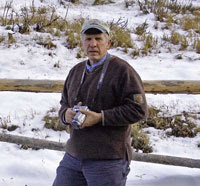Beyond Civilization: Humanity’s Next Great Adventure. Daniel Quinn. 1999. ISBN 0-609-60490-2.
EXCERPTS
Programs never stop the things they’re launched to stop. No program has ever stopped poverty, drug abuse, or crime, and no program ever will stop them.
Old minds think: How do we stop these bad things from happening?
New minds think: How do we make things the way we want them to be?
Old minds think: If it didn’t work last year, let’s do MORE of it this year.
New minds think: If it didn’t work last year, let’s do something ELSE this year.
One can imagine how desperately the pontiffs, potentates, dynasts, princes, pendragons, princelings, rajahs, hierophants, priests, priestesses, and palace guards of all these tottering civilizations must have desired to implant in the minds of their vacillating subjects this very simple concept: Civilization must continue at ANY cost and must not be abandoned under ANY circumstance.
Karl Marx recognized that workers without a choice are workers in chains. But his idea of breaking chains was for us to depose the pharaohs and then build the pyramids for ourselves, as if building pyramids is something we just can’t stop doing, we love it so much.
Our cultural vision was shaped by people who were perfectly satisfied with the notion that the universe they saw was in its final form, and had come into being in that form – in a single stroke, so to speak. The Genesis tale of creation didn’t originate this notion; it merely affirmed it: God did his work, saw it was in no need of improvement, and that was that.
Natural selection is a process that separates the workable from the unworkable, not the perfect from the imperfect.
… there’s a difference between painting in order to make money and making money in order to paint.
The way rulers benefit from the success of the society is vastly different from the way the masses benefit, and the pyramids and the temples testify to the importance of the rulers, not to the masses who build them.
Kids of all ages run off to join the circus. No one runs off to join Disney World.
As everyone knows (especially revolutionaries), hierarchy maintains formidable defenses against attack from the lower orders. It has none, however, against abandonment. This is in part because it can imagine revolution, but it can’t imagine abandonment. But even if it could imagine abandonment, it couldn’t defend against it, because abandonment isn’t an attack, it’s just a discontinuance of support.
We deeply believe in taking a military approach to problems. We proclaim a “war” on poverty. When that fails, we proclaim a “war” on drugs. We “fight” crime. We “combat” homelessness. We “battle” hunger. We vow to “defeat” AIDS.
One element of acceding to homelessness is accepting the fact that the poor will consistently choose the least worst alternative available to them. If you find them living under a bridge instead of in a nice, clean municipal shelter just a block away, you can be absolutely sure they haven’t made a mistake – from their point of view. The shelter’s admittance procedures may be intolerably invasive, arbitrary, or humiliating, or its rules may be Draconian. Whatever, the discomforts of sheltering under the bridge are more endurable.
Acceding to homelessness would look like helping the homeless succeed WHILE being homeless. What an idea! I can almost hear the howls of outrage from both liberals and conservatives that must greet such a concept. Help people succeed at being homeless? We want them to fail at being homeless! (So they’ll return to the mainstream.)
Don’t try to drive the homeless into places we find suitable. Help them survive in places they find suitable.
Because the tribe is its members, the tribe is what its members want it to be – nothing more and nothing less.
The tribe, in fact, is just a wonderfully efficient social organization that renders making a living easy for all – unlike civilization, which renders it easy for a privileged few and hard for the rest.
Communes never begin in this haphazard way. They’re “intentional” communities, originating among people who want to live together in pursuit of common ideals, usually in relative isolation. Communes are about living together and may or may not involve working together. Tribes (and I speak here of “new” tribes, of course) originate among people who want to pool their energies and skills to make a living together. Tribes are about working together and may or may not involve living together.
It’s a fundamental tenet of our cultural mythology that the only thing wrong with us is that humans are not made well enough. We need to be made of finer materials, to some set of better specifications (provided, perhaps, by greened-up versions of our traditional religions). We just need to be made kinder, gentler, sweeter, more loving, less selfish, more far-sighted, and so on, then everything will be fine. Of course, no one succeeded in making us better last year or the year before that or the year before that or the year before that – but maybe this year we’ll get lucky … or next year or the year after that.
QUOTATIONS
Jacques Attali
Machines are the new proletariat. The working class is being given its walking papers.
Marshall Sahlins
The world’s most primitive people have few possessions, but they are not poor. Poverty is not a certain small amount of goods, nor is it just a relation between means and ends; above all it is a relation between people. Poverty is a social status. As such it is the invention of civilization.
Subscribe to:
Post Comments (Atom)

No comments:
Post a Comment